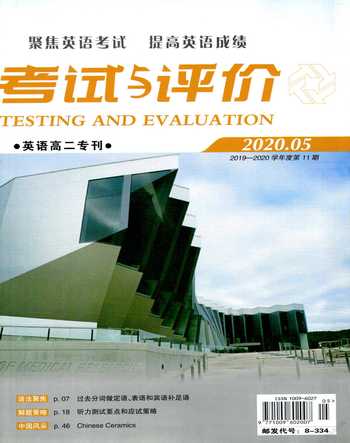过去分词做定语、表语和宾语补足语
冯强
一、 过去分词做定语
过去分词做定语所表示的动作发生在谓语动作之前已完成,而且与它所修饰的名词或代词在逻辑上为被动关系,即被过去分词所修饰的名词或代词是分词动作的承受者,相当于一个定语从句。例如:
In the process of the competition, you should pay attention to the rules made by us.
Tsinghua University, founded in 1911, is home to a great number of outstanding figures.
We saw an abandoned farm in the distance.
Finally the woman found her lost child with the help of the police.
The professor, known as a splendid speaker, was warmly received by the students.
It was in his childhood that he read most of the books written by Mark Twain.
The tall building completed last month is our new classroom building.
二、 过去分词做表语
过去分词做表语时,说明主语的性质、状态或特征。过去分词与其逻辑主语之间表示被动关系,所表示动作一般发生在谓语动词之前或同时发生。常用作表语的过去分词有amazed, amused, astonished, complicated, confused, contented, discouraged, delighted, distinguished, excited, exhausted, experienced, frightened, hurt, injured, interested, pleased, puzzled, qualified, satisfied, surprised, tired, married, worried, wounded等。例如:
On hearing the good news that our new products sold well in the market, we all got excited.
John's performance in this exam made us feel rather disappointed.
When we got there, the shop was closed.
【拓展】 “情感类”分词形容词在做定语或表语时的用法区别:现在分词构成的形容词常用来修饰事物,表示被修饰的词本身具有的性质,常译为“令人……的”;而过去分词构成的形容词常用来修饰人,常译为“(人)感到……的”。例如:
It is far more interesting for me to chat online with friends than to watch TV. (对我来说,在网上和朋友聊天要比看电视有趣得多。)
I thought she might be interested in Paula's proposal. (我觉得她可能会对葆拉的提议感兴趣。)
The lecture was so boring that many of the students in the classroom fell asleep. (这个演讲非常乏味,以致教室里的很多学生都睡着了。)
The children quickly got bored with staying indoors. (孩子们在屋子里很快就待不住了。)
三、 过去分词做宾语补足语
过去分词做宾语补足语时,逻辑主语是其前面的宾语,表示一个被动或完成的动作。过去分词做宾语补足语考查的重点是have/get... sth. done, make oneself heard/known/ understood等。过去分词做宾语补足语时,从逻辑上应抓住宾语与宾语补足语之间的语态关系,即二者之间是被动关系,宾语是分词动作的承受者。
常用过去分词做宾语补足语的动词有have, make, get, find, see, notice, watch, hear, feel, want, like等。例如:
He raised his voice to make himself heard.
He found all the deaths linked to the polluted water.
The scientists wanted to keep people informed about the breakthrough in their experiment.
【拓展】 现在分词所表示的动作一般与句中谓语动词所表示的动作同时发生, 与其逻辑主语之间是主动关系。常见动词有see, watch, hear, observe, notice, feel, find, glimpse, glance等感官动词和look at, listen to等短语动词以及have, keep, get, catch, leave, set, start, send等;过去分词与其逻辑主语之间是被动关系,所表示的动作一般发生在谓语动词之前或同时发生。常见动词有allow, ask, consider, desire, expect, feel, find, get, have, hear, imagine, keep, like, make, observe, order, permit, prefer, remember, request, require, see, urge等。例如:
He got his tooth pulled out yesterday. (他昨天把牙拔了。)
I was almost asleep last night when I suddenly heard someone knocking at the door.(昨天晚上我快睡着的时候突然听到有人在敲门。)
The policeman kept his eyes fixed on the screen of the computer to identify the criminal's footprints. (警察眼睛盯着电脑屏幕以辨认罪犯的脚印。)
She looked at him waiting there. (她看着他等在那里。)
I'll still be unable to make myself understood in the discussion, which worries me a lot. (在讨论中我仍然不能让大家明白我的意思,这让我很焦急。)
When he was in hospital, the nurse had his temperature taken every four hours. (在他住院时,每隔四个小时护士给他量一次体温。)
I could feel the wind blowing on my face. (我能感觉到风吹着我的臉。)

